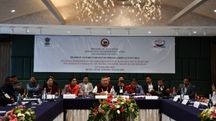Nagaland: Dimapur shutter down strike results in massive losses for businesses and banks
According to reports obtained by Nagaland Post, leading up to the strike, the five banks operating in Dimapur were transacting an average of around Rs. 9.12 crore each day until April 25.
 Nagaland: Dimapur shutter down strike results in massive losses for businesses and banks
Nagaland: Dimapur shutter down strike results in massive losses for businesses and banksThe recent two-and-a-half-day shutter down strike, spanning from April 26 to 27, with a half-day extension on April 29, has left a trail of financial losses across various sectors in Dimapur. Apart from the significant setback in business transactions among trade and business firms, banks also witnessed a drastic reduction in financial transactions during the strike period.
According to reports obtained by Nagaland Post, leading up to the strike, the five banks operating in Dimapur were transacting an average of around Rs. 9.12 crore each day until April 25. However, during the strike, bank transactions plummeted to approximately Rs. 2.76 crore in a single day across the five banks, resulting in a staggering net reduction of financial transactions amounting to Rs. 6.36 crore per day.
The strike, which was called off following the state government's acceptance of the Dimapur Chamber of Commerce & Industry (DCCI’s) 5-Point Charter of demands, highlighted the urgent need for action against illegal collections. The government directed the Director General of Police and the Commissioner of Nagaland to swiftly act against those involved in illegal collections, with the mandate to book them under the National Security Act (NSA). While extortion activities may have temporarily subsided, reports indicate ongoing forcible collections by certain groups.
Recent incidents of unauthorized parking fee collections have also raised concerns among residents and businesses. Reports surfaced of individuals demanding parking fees under the guise of Dimapur Municipal Council (DMC) regulations. Some shop owners disclosed instances where youths on bikes demanded parking fees, raising questions about the legitimacy of such collections. Clarity is sought from the DMC regarding authorized areas for parking tax collection and applicable rates to curb such unauthorized practices.
In addition to these issues, the surge in vegetable prices at Dimapur markets has further exacerbated the concerns of residents. The DMC, when approached by reporters, clarified that market rates are determined based on input provided by wholesalers, suggesting that price determinations are not within the purview of the civic body but lie with wholesalers.
Copyright©2026 Living Media India Limited. For reprint rights: Syndications Today









